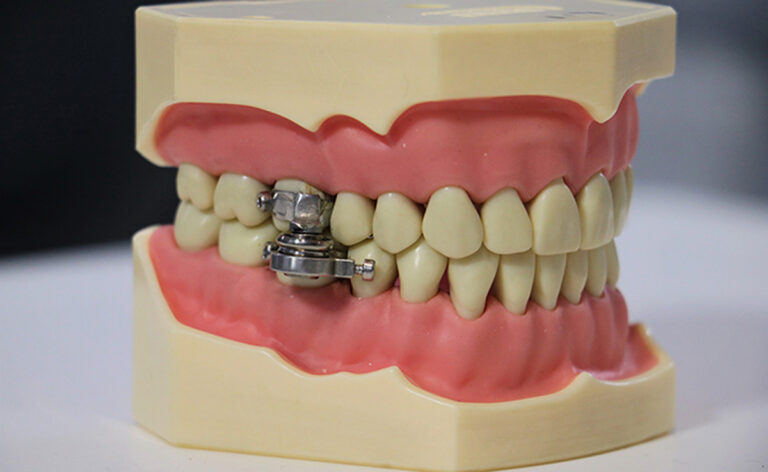Horrific new weight-loss invention locks your mouth shut using magnets

Every single time I think the world can’t get more Black Mirror-esque, it does. Society’s obsession with diet culture has people trying everything from juice cleanses and meal replacements to locking their mouths shut. Yes, you read that right. The new weight-loss tool has been researched and developed by both Leeds-based scientists and medical professionals from the University of Otago in New Zealand. No, the headline wasn’t clickbait, the device locks your mouth shut—quite literally.
As someone who has dealt with an eating disorder and accompanying body dysmorphia my entire life, I should warn you that this device may be triggering for some.
Otago and UK researchers have developed a world-first weight-loss device to help fight the global obesity epidemic: an intra-oral device that restricts a person to a liquid diet. Read more: https://t.co/eLhXwipiqs pic.twitter.com/Of6v3uvVbX
— University of Otago (@otago) June 28, 2021
The self-proclaimed “world-first” device, named the DentalSlim Diet Control, is fitted to the upper and lower back teeth by a dental professional. The tool’s core mechanics comprise magnetics that is fitted with custom-manufactured bolts; these work to restrict the wearer from opening their mouths any wider than about 2 millimetres. Its intention is to restrict the user to a liquid-only diet without affecting speech or breathing.
According to a study conducted by the same team of researchers, the DentalSlim Diet Control was responsible for a “mean weight loss of 6.36 kilograms” in participants across a two-week period. They reported that once the time period was up, participants “were further motivated to lose more weight.” That’s hardly shocking though, given that they literally had their mouths sealed shut. It’s nothing more than a starvation diet. It places the ‘solution’ to obesity on calories and liquids, rather than mental health and proper nutrition. I mean, what’s stopping me from drinking melted chocolate? Trust me, I’d do it.
The lead researcher behind the torture device is University of Otago’s Health Sciences Pro-Vice-Chancellor, Professor Paul Brunton. He claims that it is “a non-invasive, reversible, economical and attractive alternative to surgical procedures. The fact is, there are no adverse consequences with this device.” People don’t seem to agree, the fact is, it’s crazy.
This medieval sounding machine has obviously been criticised by many. The director of external affairs at Beat—the UK’s leading eating disorder charity—Tom Quinn, told The Independent, “It is incredibly concerning to read that this is a proposed solution to supporting someone with obesity. We know that many people living with obesity are also affected by binge eating disorder (BED), which often goes undiagnosed.” SEED Eating Disorder Support Services’ manager and actress, Gemma Oaten agreed, calling it “horrific.”
She added, “The fact that a university has gone to the lengths to produce this and then share it on social media where all of the people who are struggling right now have access to it is only compounding the whole narrative that obesity is just a physical thing that needs addressing.” The reaction on social media to this device has been anything but positive.
Shortly after making headlines for its invention, the university tried to further justify itself on Twitter, writing: “To clarify, the intention of the device is not intended as a quick or long-term weight-loss tool; rather it is aimed to assist people who need to undergo surgery and who cannot have the surgery until they have lost weight.” In spite of this reasoning, the device does little to actually combat the causes of obesity and is just another dangerous fad in diet culture.
To clarify, the intention of the device is not intended as a quick or long-term weight-loss tool; rather it is aimed to assist people who need to undergo surgery and who cannot have the surgery until they have lost weight.
— University of Otago (@otago) June 28, 2021
One Twitter user responded to the University of Otago with the perfect summary, “A holistic solution to obesity that focuses on its socio-economic roots and promotes access (time, cost, etc) to healthy sustainable diets? No, let’s bolt fatties’ mouths shut and put them on a forced juice cleanse!”
For anyone struggling with the subject matters in this piece, there are a number of UK-based eating disorder charities available to contact. Beat is the UK’s leading eating disorder charity and its helplines are open 365 days a year, 9 a.m. to 8 p.m., available on 0808 801 0677.




